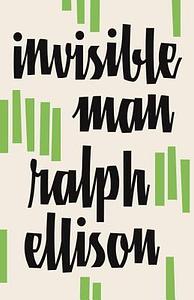Take a photo of a barcode or cover
adventurous
challenging
dark
funny
mysterious
reflective
tense
medium-paced
Plot or Character Driven:
A mix
Strong character development:
Yes
Loveable characters:
Complicated
Diverse cast of characters:
Yes
Flaws of characters a main focus:
Complicated
Reading this book in high school was eye-opening, especially since my hometown was very white. We had to memorize the last line of it for an assignment, and it's never left my mind. It gives me chills every time I read it.
I think this is one of the most important books in American literature, and unfortunately, it still feels relevant. I highly recommend reading it if you haven't yet.
I think this is one of the most important books in American literature, and unfortunately, it still feels relevant. I highly recommend reading it if you haven't yet.
challenging
dark
emotional
funny
tense
slow-paced
challenging
dark
reflective
sad
tense
slow-paced
Plot or Character Driven:
Character
Strong character development:
Yes
Loveable characters:
Complicated
Diverse cast of characters:
Complicated
Flaws of characters a main focus:
N/A
challenging
emotional
funny
mysterious
reflective
sad
slow-paced
Plot or Character Driven:
Character
Strong character development:
Yes
Loveable characters:
Yes
Diverse cast of characters:
Yes
Flaws of characters a main focus:
Yes
One thing about Joe Morton. That man is going to ACT 🗣️
A deeply impactful novel. So many lines that stuck out to me but the visual of someone using a brand new tie to tourniquet a wound will stay with me for a long time
adventurous
dark
emotional
funny
mysterious
reflective
sad
tense
medium-paced
Plot or Character Driven:
A mix
Strong character development:
Yes
Loveable characters:
Yes
Flaws of characters a main focus:
Yes
This book starts with a scene that may be familiar to you even if you’ve never read it, because it is the scene that most people writing about Invisible Man tend to talk about. It’s referred to shorthand as “the battle royal”, and describes a gathering of white businessmen and local grandees into which a handful of Black high schoolers is imported. Our narrator, unnamed, has just won a major speech competition and thinks he’s been brought in to give his speech. Really, the boys are there to undergo a series of humiliating physical assaults, including being forced to fight each other blindfolded and bare-knuckled, and being forced to crawl for coins around and onto an electrified floor mat that shocks them when they touch it. Only after these tortures is our narrator encouraged—rather, forced—to give his speech, which he does with a sense of deep confusion and humiliation, having to shout over the hecklings of the crowd, who sardonically ask him to repeat himself every other sentence.
You can see why most readers get stuck on this scene, though I can’t help but wonder if Ellison shot himself in the foot by putting it so soon. It’s very powerful and very disturbing. Still, it doesn’t entirely represent the experience of reading Invisible Man, which is less a novel of “the Black Experience” (capital letters mandatory) and more a novel of total disillusionment, of complete unraveling not just from the racist demands of white supremacy but from the pressure coming from one’s own “people”. I’ve never read a novel by a Black author—certainly not one written so early in the twentieth century—that more fully captured the cruel contortions of “racial uplift” thinking, the attitude that educated Black people were responsible not only for dragging poorer Black people out of “ignorance” but for actually making the whole race “more human”. A huge chunk of the first part of the book involves our narrator—at this point an undergraduate at what’s clearly meant to represent the prestigious Tuskegee Institute—driving a very wealthy white donor, Mr. Norton, around the campus. Norton’s interest in our narrator is noticeably self-centered and utilitarian: he believes the young man important only because he believes him to be essential to his (Norton’s) “destiny”, whatever that means. They end up in a section of the grounds containing old slave cabins (presumably from when the campus was a plantation), where poor sharecroppers now live. Norton’s encounter with one of these men, Trueblood, shocks him badly, and our narrator’s attempts to revive him with whisky take them both to a local bar-cum-brothel, where another Black man, an inmate of the local lunatic asylum, speaks to Norton with an openness and lack of deference that do even more damage. Despite Norton’s assurances that he bears the narrator no ill-will and knows none of this was fault, the narrator is expelled. His conversation with Dr. Bledsoe, the Black principal of the college, chillingly reveals the nature of the deal that white supremacy asks Black men to make in exchange for power in their arena:
“I’s big and black and I say ‘Yes, suh’ as loudly as any burrhead when it’s convenient, but I’m still the king down here. . . . The only ones I even pretend to please are big white folk, and even those I control more than they control me. . . . That’s my life, telling white folk how to think about the things I know about. . . . It’s a nasty deal and I don’t always like it myself. . . . But I’ve made my place in it and I’ll have every Negro in the country hanging on tree limbs by morning if it means staying where I am.”
Bledsoe proves a more formidable enemy than most of the white characters, poisoning the narrator’s chances of getting a job in New York by sending pre-emptive character assassination letters to his contacts. After abortive attempts at industrial work, one of which involves an accident serious enough to cause a head injury, the narrator discovers a talent for public speaking and is welcomed by “the Brotherhood”, a multi-racial group of organisers who seem to be a thinly veiled Communist Party. From the start, the reader wonders if and when the narrator’s adulation from the Brotherhood’s committee might turn sour, but the narrator himself refuses to allow himself what he thinks of as backwards and unenlightened race-based suspicion, and plunges ever deeper into community organising. The murder of an unarmed black Brother, Tod Clifton, by a white police officer plunges Harlem into mourning and forms the Brotherhood’s rationale for pulling out of Black neighbourhoods—a process which finally leads to the narrator’s complete disillusionment with any form of social belonging or endeavour.
There’s a tiny ray of hope at the end; famously, the narrator lives alone and underground in total isolation as he tells us his story, but it seems as if he might be about to head back into the sun and air, the world of action and striving, changed and refreshed. Mostly, though, this is a novel describing the downward spiral of a person’s hope, and you’d think, therefore, that it might be depressing or at least hard going. It isn’t hard going at all, largely because Ellison is a fantastic writer. He’s miles ahead of Wright, for example, whose Native Son (1940) and Black Boy (1945) are often bracketed with Invisible Man. On a sentence level, he’s a delight to read where Wright is rarely more than competent. He’s funny. (“Beware of those who speak of the spiral of history; they are preparing a boomerang. Keep a steel helmet handy” could be Vonnegut.) He can do wry aphorism: “I do not know if all cops are poets, but I know that all cops carry guns with triggers.” Above all, he has a clarity of expression that cuts through to the heart: “Everywhere I’ve turned somebody has wanted to sacrifice me for my own good—only they were the ones who benefited. And now we start on the old sacrificial merry-go-round. At what point do we stop?” Invisible Man feels utterly fresh and contemporary to read because it’s working through these complicated philosophical and personal questions in that clear, incisive language.
It’s gutting to know that Ellison never completed another novel: when he died, the manuscript for his second was thousands of pages long, and two cut-down versions have been published posthumously, but neither is the book he wanted to produce. Still, he did this, and this has kept him in print, read, and studied for seventy years. It’s prime literature. Do yourself a favour and check it out.
Source: Senate House Library #loveyourlibrary #1952club
This... might be the best-written book I've ever read. Not only was Ellison's writing itself revelatory and masterful, but the story and narrator will live in my marrow from here on out. As a novel and as social critique, it's a marvel that is unparalleled.
As I write this the U.S. has passed the boiling point in regards to the number of black men killed by police. The last chapters of Invisible Man describe police shooting an unarmed black man to death and the ensuing riots in Harlem. Ellison's complex, nuanced, intelligent, and heartfelt writing about that incident and broader race relations are absolutely relevant 60 years after it was published. This seems like an excellent time to revisit the book if you haven't read it for a while, or read it for the first time as I did.
As I write this the U.S. has passed the boiling point in regards to the number of black men killed by police. The last chapters of Invisible Man describe police shooting an unarmed black man to death and the ensuing riots in Harlem. Ellison's complex, nuanced, intelligent, and heartfelt writing about that incident and broader race relations are absolutely relevant 60 years after it was published. This seems like an excellent time to revisit the book if you haven't read it for a while, or read it for the first time as I did.





